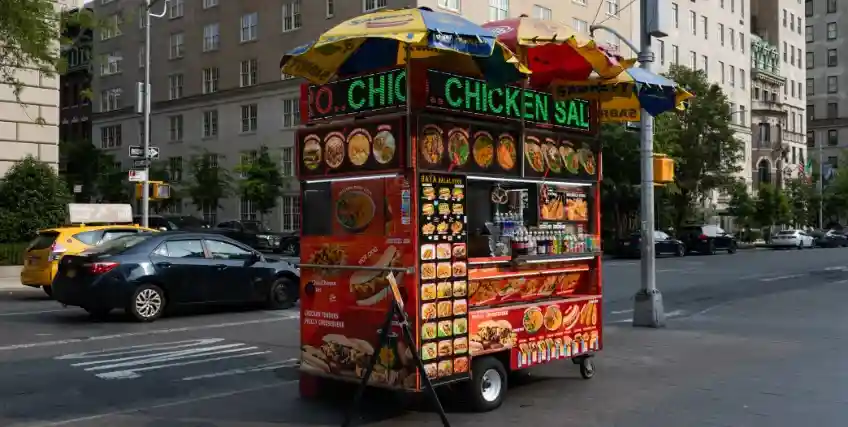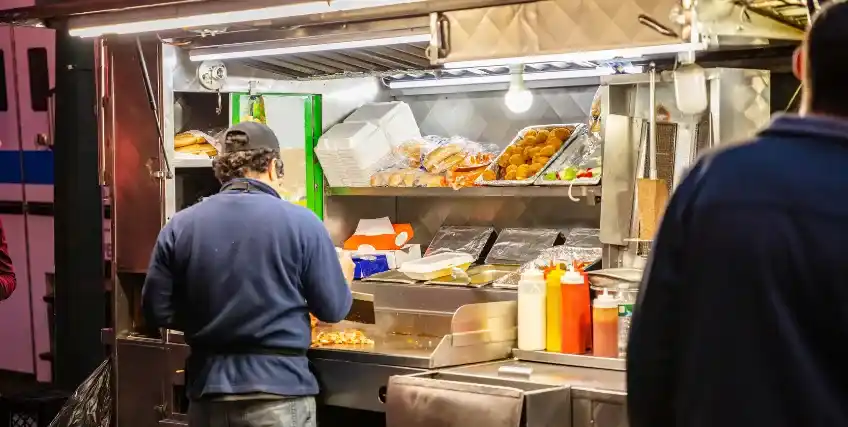Cart Financing:
A Complete Guide for Small Vendors and Businesses
Looking for Business Financing?
Apply now for flexible business financing. Biz2Credit offers term loans, revenue-based financing, lines of credit, and commercial real estate loans to qualified businesses.
Set up a Biz2Credit account and apply for business financing.
Carts are a common part of daily life in the United States. From retail and malls to hospitality and food vendors, carts support mobility, boost convenience and enhance customer service. There are various carts that reflect lifestyle preferences and evolving retail strategies, from shoppers moving around bulky purchases to food businesses serving communities. As market demand grows, cart financing and small vendor financing are helping entrepreneurs and retailers invest in carts without hindering cash flow. This makes cart ownership more accessible and sustainable for businesses.
Additionally, many businesses also need equipment such as cooking units, refrigeration, storage, seating, or mobility upgrades. This is where vendor cart equipment financing steps in. It lets business owners fund essential add-ons and equipment without large upfront costs. Whether upgrading a food cart, enhancing a mall kiosk, or improving a hospitality transport cart, this financing option helps vendors improve functionality and efficiency.
What Is Cart Financing and How Does It Work?
Cart financing helps businesses to buy or lease carts, through structured payments rather than paying the full amount upfront. It supports both established companies and new entrepreneurs, who rely on carts for mobility, marketing, sales, or customer service. This includes cart financing for malls, retail carts, food carts, pop-up vendors, and golf or hospitality transport carts.
Lenders provide financing for the cart itself, as well as equipment, such as storage units, POS systems, and mobility upgrades. Small business owners can access loans, leasing plans, or vendor cart equipment financing, based on their needs and budget. Repayments are commonly on a monthly basis and may require a personal guarantee or basic business records.
Types of Carts Commonly Used in the U.S.
Carts play a key role in retail, hospitality, and food service across the United States. They boost customer experiences while also promoting the brand on wheels. Popular use cases include:
Retail/Mall Carts:
Mall kiosk carts and mobile retail carts enable brands to sell products in high footfall areas, without the cost of a full store.
Food Carts/Street Food Stalls:
Food entrepreneurs use food carts to serve local communities at markets, fairs, and exhibitions. Growing demand for food cart financing reflects the rise of mobile food culture across the U.S.
Golf Carts:
Hotels, golf courses, theme parks, airports, and large venues use carts for easy mobility. Many businesses opt for cart financing rather than direct purchase, to efficiently manage capital.
Service Carts:
These are used in healthcare facilities, campuses, events, and commercial spaces for cleaning, security, transport, and logistics.
Pop-Up/Small Vendor Carts:
Micro sellers, flea market vendors, farmers’ market stalls, and craft businesses, are dependent on carts for low-cost selling. Many seek small vendor financing to start or expand operations.
Why Businesses Choose Cart-Based Models
Cart based business models in the US are growing due to their low-setup costs compared to physical stores, flexibility to operate in high-demand locations, and rapid launch timelines. Carts also provide higher customer engagement, sometimes due to 'moving' visibility, and growth potential, ideal for newcomers in the market who are testing it out. It has increasingly become a preferred model for modern retail marketing strategies and street food entrepreneurship. Flexible financing, including street food cart funding and business loans for food stalls, has made entry easier for first-time business owners.
Financing Options for Cart Businesses?
Cart financing in the United States, such as a food or retail cart, is typically accessed through small business loan options. This includes SBA loans, equipment financing, traditional bank loans, and alternative online lenders. Here is a list of common financing options for carts:
SBA Loans (Small Business Administration)
SBA loans are a popular choice, specifically for startups, because the SBA guarantees a portion of the loan. It reduces risk for lenders, allows more favorable terms and lower interest rates for qualified applicants.
- SBA 7(a) Loans: These versatile loans can be used for most business purposes, including purchasing equipment, working capital, or buying an existing business.
- SBA Microloans: Ideal for smaller funding needs, SBA microloans are offered through non-profit intermediary lenders and are often used for inventory and working capital.
Equipment Financing
This type of loan is specifically for purchasing the cart and necessary equipment. The equipment itself serves as collateral, making it easier to qualify for, even with an average credit score.
Traditional Bank Loans:
Banks and credit unions offer traditional business term loans with competitive interest rates and longer repayment terms, for established businesses.
Business Line of Credit:
This provides access to a flexible amount of funds, to be drawn out as needed, with interest only charged on the used amount. It is ideal for covering unexpected expenses or managing seasonal cash flow fluctuations.
Personal Loans/Credit Cards:
For those just starting out, personal loans or business credit cards can be used. A quick source of capital, choosing this financing option also means that the business owner is personally liable for it. This loan may impact personal credit, in case of defaults.
Tips to Qualify for Cart Financing
Qualifying cart financing depends on the type of cart, the business model, and a solid financial record. Lenders assess credit stability, projected revenue, and the purpose of the cart, before approving a loan. Below are the common requirements laid out by lenders, when reviewing cart financing applications:
- Cart type, cost, and equipment requirements
- Business registration/vendor license
- Proof of income
- Projected revenue
- Credit history, though some lenders may accept thin credit
- Business plan outlining location, products/services, and pricing
Costs to Consider Before Cart Financing
Before opting for cart financing in the U.S., consider upfront costs, including a down payment, and other ongoing expenses, including insurance, maintenance, and so on. Having a clear picture of these expenses, ensures that the right loan has been chosen. Here are a few typical costs to consider, before taking up cart financing:
Choosing the Right Cart Financing Partner: Factors to Consider
Choosing the right cart financing partner involves several steps, as it can make or break a business. It includes comparing offers, prioritizing transparent terms, assessing the lender's credibility and customer service. Here are common factors to consider, when choosing the right cart financing partner:
Compare Interest Rates:
This is a major factor in the total cost of the loan. Compare the Annual Percentage Rate (APR), which includes the interest rate and other charges, offered by different lenders. Hidden costs or unexpected fees should be factored in, that may increase the total expense.
Check Lender Credibility:
Researching the financing partner's reputation through online reviews, is crucial. A credible lender will lay out transparent terms and a history of good customer service.
Evaluate the Application-Approval Process:
Opt for a partner with a quick application and approval process. Choosing a streamlined, mobile-friendly system may reduce friction and enable quicker purchases.
Assess Flexibility:
The ideal cart financing partner should offer a range of financing options, including different loan amounts, terms, and payment schedules, to suit specific needs. Inquire about flexibility options for unforeseen changes that may arise.
Understand Loan Terms and Conditions:
Read the contract carefully, including the payment schedule, interest rate, fees, and any early repayment penalties. Clear all doubts; ensure all terms are understandable, and the interest rate isn't higher than the lender's "buy rate" (if using a dealer).
Get Pre-Approved First:
Obtain pre-approval from a bank or credit union, before visiting a dealership. This gives a clear understanding of budget and negotiating power when discussing dealer financing options.
Consider Down Payments:
Making a lump sum down payment typically leads to lower monthly payments and potentially better interest rates.
Assess Customer Support:
Select a responsive financing partner, offering reliable customer support.
Align Budget:
Review and align monthly income in contrast to expenses, to determine a comfortable monthly payment.
Right Financing Partner Ensures Ownership, Supports Growth
Cart based business models continue to grow across the United States, supported by flexible lending and financing solutions. These can be tailored per the needs of small vendors, retailers, hospitality operators, and recreational users. So, whether you are building a mobile food stall, starting a mall kiosk, or planning a golf cart purchase, the right funding partner helps businesses stay cost conscious. Alongside food cart financing, many lenders now provide golf cart financing with competitive rates, simple application processes, and swift credit approval. Buyers may get pre-qualified online, before buying a new or previously-owned golf cart, to speed up credit decisions and compare financing offers.
Some dealerships and in-house lending providers offer cart financing with flexible payment options, allowing owners to pay off the balance early. However, it is important to check for pre-payment penalties in advance. Popular brands such as Club Car and recreational mobility products including ATVs, also qualify for specialised financing programs. Before signing the final loan deal, review terms, interest, loan payments, and any disclaimer that highlights limitations.
With thoughtful finance planning, from small vendor cart lending to golf cart loan solutions, businesses can invest in convenience and mobility, without cash crunches. The right financing partner keeps ownership affordable, supports growth, and ensures long-term value.
Trusted by Thousands of Small Business Owners in America.**
Simply because we get what you go through to build a business you believe in.
**Disclaimer: All stories are real, as told by real business owners. Customers do not receive monetary compensation for telling their stories.
From One Entrepreneur to Another: We Get You
We understand what's behind building a business you believe in.
All stories are real, as told by real business owners. Customers do not receive monetary compensation for telling their stories.



Cart Financing Articles
How Cart Vendors Can Unlock Growth Through Mobile Vendor Financing
Smart mobile vendor financing choices support business expansion, equipment upgrades, and smoother working...
Sustainable Cart Financing: How Mobile Carts Upgrade to Green Equipment
The mobile cart space in the U.S. is changing fast. More and more vendors are now looking at sustainability...
Food Cart Financing: Funding Your Mobile Business with a Small Cart
The food truck business is booming across the United States. According to IBISWorld, the food truck industry...
FAQs About About Cart Financing
1. What is cart financing and how does it work in the United States?
Cart financing in the United States lets businesses buy or lease carts, through a structured payment plan. It helps vendors wade through high upfront costs and is commonly used for retail carts, mall kiosks, food carts, and golf carts. Many lenders now offer cart financing tailored for small businesses and mobile vendors.
2. What food cart financing options are available for new food stall businesses?
There are several online food cart financing options for street food vendors and small food stall owners. These involve business loans for food stalls, equipment leasing, microloans, and street food cart funding through local grants and nonprofit community programs. Some lenders also provide food cart financing packages, including cart purchase plus equipment.
3. Can I get small vendor financing with low credit?
Many lenders offer small vendor financing and vendor cart equipment financing, even with low or limited credit history. Options may include using the cart as a collateral for secured financing, alternative online lenders, and short-term working capital loans. Interest rates may be higher, so comparing lenders is essential.
4. What types of carts can be financed through cart financing in the US?
US lenders provide cart financing for different types of carts, including food carts, retail carts, pop-up vendor carts, mall kiosk carts, golf carts, hospitality carts, and utility carts for campuses or airports. Businesses may also finance add-ons, such as POS systems, appliances, and vendor equipment through vendor cart equipment financing.
5. How can a small business qualify for business loans for food stalls or food cart financing?
To qualify for business loans for food stalls, lenders typically check the business plan, vendor permit, estimated revenue, credit score, and years in business. New street vendors may still access street food cart financing through micro-financing programs, nonprofit lenders, or city supported vendor grants.
Frequent searches leading to this page
Term Loans are made by Itria Ventures LLC or Cross River Bank, Member FDIC. This is not a deposit product. California residents: Itria Ventures LLC is licensed by the Department of Financial Protection and Innovation. Loans are made or arranged pursuant to California Financing Law License # 60DBO-35839



